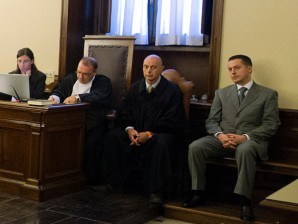
In this photo released by the Vatican paper L’Osservatore Romano, pope’s butler Paolo Gabriele, right, sits in the wood-trimmed courtroom of the Vatican tribunal, at the Vatican, Saturday. AP FILE PHOTO
VATICAN CITY – A Vatican court on Saturday convicted a computer programmer working in the tiny state of helping Pope Benedict XVI’s butler leak confidential papers in a scandal that has embarrassed the Vatican.
The court handed 48-year-old Claudio Sciarpelletti a suspended sentence of two months in prison with a probationary term of five years, meaning that if he respects the terms of his probation he will likely not have to go to prison.
Sciarpelletti’s trial comes just weeks after the disgraced former butler, Paolo Gabriele, was convicted and sentenced to 18 months in prison for engineering the leaks of secret letters and memos from the papal residence.
Sciarpelletti has worked for the past 20 years in the Secretariat of State — effectively the government of the Roman Catholic Church — and was responsible for maintenance on all the computers used by Vatican employees.
The leaks, which were published in a book by an Italian journalist, revealed fierce infighting in the highest echelons of the Catholic Church and allegations of fraud in the running of the Vatican, the world’s smallest state.
Gabriele said he had acted out of loyalty to the Church and to root out “evil and corruption” from the Vatican, telling judges at his own trial last month that he believed the pope was poorly informed on important issues.
The apparent ease with which documents were smuggled out of the Vatican has surprised observers, and Italian media reports say there could have been a wider conspiracy of disgruntled employees beyond Gabriele and Sciarpelletti.
Investigators said they found a mysterious envelope bearing the official stamp of the Holy See in a drawer in Sciarpelletti’s desk. It contained copies of some of the confidential documents which later appeared in the book.
Sciarpelletti said he never opened the envelope but was unclear about who had given it to him, initially telling investigators it was Gabriele and later saying he had received it from a prelate named only as “W” in court documents.
The envelope’s contents criticised the Vatican police force’s powerful chief Domenico Giani and alleged that two officers from the corps also held stakes in private security firms in Italy in a possible conflict of interest.
The case has lifted a lid on unease in the Vatican about the growing power of the gendarmerie and tensions between the 150-person police corps and the Swiss Guards, the traditional defenders of the papacy since the 16th century.
The trial in the Vatican’s tiny courtroom has been followed by a group of 10 journalists and no cameras were allowed to protect the defendant’s privacy.
The two trials into the “Vatileaks” case have been the biggest in the modern history of the Vatican, whose court normally only tries cases of petty theft targeting the millions of tourists who visit the famous city state every year.
The investigation into the leaks case is ongoing and Vatican prosecutors have said they do not rule out filing more serious charges of violation of state secrets.